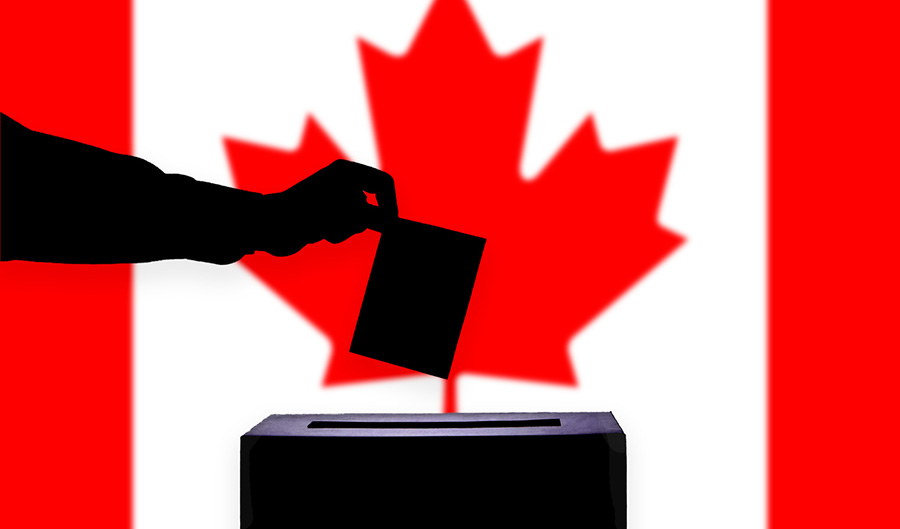“Canada’s foreign policy is more important now than it has been in a generation,” states the Conservative Party of Canada’s election platform. Yet international issues were largely ignored in the 44th federal election campaign. This is part of a long tradition of preferring to debate national and even provincial issues rather than an area that is the exclusive responsibility of the federal government. Even at the height of the war in Afghanistan in the first decade of the new millennium, Canadians were not interested in these issues during elections. There is every reason to believe that this trend won’t come to an end this year. Foreign affairs remain far from voters’ priorities, with the pandemic and cost of living being their main concerns.
Many deplore this situation, pointing out that if Canada ignores the world, the world will not ignore it back, as evidenced by the Chinese taking Canadians hostage, Russian interference in the Canadian elections, or the hundreds of Canadians still trapped in Afghanistan.
Others feel that Canada has little control over international affairs and that it is difficult for opposition parties to come up with good ideas in this area because of the lack of access to classified information. However, this has not stopped party leaders from debating international policy in the past. As recently as 2015, Justin Trudeau’s Liberals stood out with their proposals to take in 25,000 Syrian refugees, end combat operations against the Islamic State, and save billions by skipping on acquiring F-35 fighters. This election is a powerful reminder that election campaigns have a significant impact on Canada’s international relations and the lives of Canadians.
What about the 44th federal election? How did the political parties fare on foreign policy? An examination of the media coverage of the election campaign reveals, not surprisingly, the limited attention paid to international affairs by the major party leaders[1]. There were two notable exceptions, Afghanistan and China, which were briefly addressed during the campaign. A comparative analysis of the election platforms reveals some elements of divergence, notably on relations with China, but above all, a broad consensus on a foreign policy that emphasizes Canadian values and on major military spending.
Afghanistan
The election was called in the wake of the Taliban takeover of Kabul, making the issue an early priority in the campaign. Despite the interest of Canadians in the conflict and the strong desire for the majority of them that Canada does everything in its power to quickly repatriate Afghan interpreters, the subject was only partially touched upon during the campaign. While each party leader quickly expressed their concerns, unanimously agreeing that assistance should be provided to Canadian nationals and Afghan collaborators, it was more difficult for them to explain what they would have done better. The main criticism towards the Trudeau government was that its response was rather reactive than proactive, a view shared by most Canadians who were disappointed with the Liberals’ handling of the crisis. In the first leaders’ “debate,” the opposition leaders attacked the Trudeau government’s evacuation plan but did not bother to present concrete alternatives. The Liberal leader defended his withdrawal plan, saying that Canada had evacuated nearly 3,700 people, more than many other European countries. While the leaders of the NDP and CPC did not respond in force on this issue, the Bloc Québécois defended Canadian inaction based on powerlessness. He stated that Canada is not a world power and that its actions on the international stage can only be carried out in coordination with its allies. The debate in English did not allow for any further discussion on the issue, other than a repetition of the criticism of the Trudeau government for having called an election in the midst of a humanitarian crisis management.
While the opposition parties seem to agree that the federal government should have acted more proactively, only the Conservative Party has articulated a concrete plan of action. In a video statement released on August 26, Erin O’Toole proposed that Canada not only continue to cooperate with its allies to evacuate Afghans, but also establish humanitarian corridors with India, and offer material and political support to the Afghan resistance against the Taliban regime. A promise that could lead to retaliation against Canada.
All political parties quickly agreed on the non-recognition of the Taliban regime, although the prevarication of Minister Marc Garneau left some doubt concerning the Liberal position at the beginning of the campaign. This promise not to recognize the new Afghan regime may come back to haunt the next Canadian government. Mariam Monsef further blurred the Liberal Party’s message by calling the Taliban “our brothers” in a video advocating for the protection of women and minorities in Afghanistan – a terminology that she explained was culturally appropriate and had a particular connotation, but which caused such an uproar that it may have cost her own seat.
It is counterproductive to avoid establishing diplomatic relations with despised regimes, as it deprives us of access that could be useful in defending our interests against them. This is why Justin Trudeau’s Liberal Party promised to restore diplomatic relations with Iran in 2015. One of the main obstacles in implementing this promise is that Iran, like the Taliban, has been identified as a sponsor of terrorism. G7’s conditionality of international aid, by contrast, appears to be a much better way to influence the new Afghan regime. Indeed, it is difficult to identify the benefits of not having diplomatic ties beyond the self-congratulation of maintaining a so-called principled foreign policy.
China
The second international issue that came up during the election campaign was China. Trudeau said he was “concerned” that a Chinese state-owned shipyard would build a passenger ferry for a Canadian state-owned company, while the Conservative Party pledged to cancel the contract once elected. Then, during an interview on Radio-Canada, Trudeau was asked about his willingness to refuse to extradite former Huawei executive Meng Wanzhou. He said bluntly that Canada would not bow to China’s “blackmail.” “To comply would put all Canadian travellers and workers in China and elsewhere in the world at risk if they know they can blackmail their way to political results by putting pressure on Canada through its citizens,” the Prime Minister added. The commemoration of the 1000th day of incarceration of Michael Kovrig and Michael Spavor was also an opportunity for the NDP leader to recall the importance of “continuing to work with our international allies to put pressure on China and allow the release of these Canadians.”
The second debate in French was characterized by Erin O’Toole’s different approach to relations with China. The Conservative leader called for a “more serious approach,” particularly with respect to Huawei’s 5G technology and trade tariffs on steel and aluminum. The NDP leader also joined him in criticizing Justin Trudeau’s lack of leadership on human rights, recalling the Prime Minister’s absence during the parliamentary vote on recognizing the genocide of the Uyghur population in Xinjiang.
It was during the English-language debate that the Chinese-Canadian relationship was most discussed. The Liberal leader said that Canada had challenged China on both human rights and economic issues. The Conservative leader criticized him, saying that Canada’s voice has been absent on the international stage to protect both Michael. Erin O’Toole borrowed the liberal slogan from 2015, stating: “Canada is needed back on the world stage. We may be smaller than China with respect to population and economy, but we’re giant when it comes to commitment, to human rights, to dignity and to the rule of law”. The Prime Minister replied that the best way to bring the two Michaels back to Canada was through coordination with allies. “You do not simply lob tomatoes across the Pacific,” he added to illustrate the impotence of more coercive measures. The exchange on China concluded with the Bloc leader’s comments on the Prime Minister’s poor record on human rights protection.
Nevertheless, a comparative analysis of the electoral platforms shows that the parties share a relatively common vision on the issue, based on a so-called “principled” foreign policy[2]. For example, the CPC and the LPC may have articulated the neo-democratic position that the party “will stand up to China with a strong and coherent strategy to defend Canadian interests at home and abroad. We will work with our allies to lead a robust and coordinated international response to China’s disregard of the rule of law. New Democrats will call out human rights abuses by China, stand with Hong Kong’s pro-democracy asylum seekers, and provide coordinated support for those facing threats by Chinese entities here in Canada.” As part of their vision for “Combatting Authoritarianism and Foreign Interference,” the Liberals promise to stop procrastinating by introducing legislation to preserve the integrity and security of telecom systems, including 5G but do not affirm, as the Conservatives do, their desire to ban Huawei from Canadian infrastructure.
The Conservatives do stand out for the virulence and detail of their proposals to “face down the threat posed by the Chinese Communist Party,” marked by “evil and tyranny.” They consider the “communist leadership” as “a clear and rising threat to Canadian interests – and our values. They’ve abducted our citizens, targeted our economy, and intimidated members of the Chinese Canadian community.” The conservatives propose, among other things, to support the idea of a “coalition of democracies,” defended by the American president Joe Biden, to “recognize the Uyghur genocide and encouraging our allies to do the same,” to set up “a permanent task force to address foreign interference,” “impose sanctions on foreign states and foreign nationals that take Canadians hostage,” withdraw Canada from the Chinese-led Asian Infrastructure Investment Bank, to “Grant asylum to mainland Chinese proponents of freedom and persecuted minorities,” as well as trying to join the Quadrilateral Security Dialogue (Quad) formed by the United States, India, Japan and Australia. It goes without saying that the adoption of such measures would lead to a severe reaction from China but the Conservative leader was evasive when asked, during the first debate in French, about the possibility of Chinese retaliation.
Military Expenditures and Interventions
A final issue came to the fore at the very end of the election campaign, with the announcement of a defence partnership between Australia, the United States, and the United Kingdom. This aims to deepen cooperation between the three allies in the fields of artificial intelligence, cyber security, long-range strike capabilities, and, above all, the development of nuclear-powered submarines. This announcement comes against a backdrop of growing rivalry with China, which has led the three allies to reorient their defence policies towards the Indo-Pacific.
Canada has been criticized not only because it was not consulted or even warned of this announcement but especially because it still does not seem to have developed a vision for dealing with the growing tensions in the region. Canada’s absence from the tripartite agreement is thus partly explained by its historically low interest in the Indo-Pacific and its apparent difficulty in determining a path forward. And yet, the Trudeau government has been working on a strategy for the region since April 2019. Its exclusion is also likely since neither political party dares to support the acquisition of nuclear-powered submarines in the ongoing process of renewing the Canadian fleet. For Mr. Trudeau, Canada won’t be in the market for nuclear-powered submarines “any time soon.” The Conservative and NDP leaders have criticized the Prime Minister for excluding Canada from the deal but have not gone so far as to suggest acquiring such technology.
This is because of the relative consensus on the planned increase in military spending. Both the NDP and CPC support the current process of acquiring tens of billions of dollars in new fighters and warships. The Conservatives and Liberals are also committed to supporting the upgrade of the North Warning System as part of NORAD modernization, acquiring two polar icebreakers, and beginning the process of replacing the submarine fleet, while the NDP and the Bloc are silent on these issues, despite the billions of additional dollars this could require.
The Conservatives are going further than others in proposing new initiatives, but they are not budgeted nor clarified. For example, they intend to “build Canadian capabilities to contribute to foreign intelligence,” without specifying whether this means creating a new foreign intelligence agency. They also propose to develop a “deterrence and detection strategy” in the Arctic, without specifying its nature, and to “launch lower earth orbit satellites for telecommunications and defence in the Arctic,” without indicating whether this would be in addition to the agreement already concluded with Télésat.
The same continuity is to be expected concerning military interventions. Both the Liberals and Conservatives propose strengthening Canada’s contribution to current NATO operations, particularly in Latvia and Ukraine. The Conservatives, however, add their willingness to provide lethal weapons and RADARSAT imagery to Ukraine. While the Conservatives favour the establishment of a NATO Arctic Operations Centre of Excellence, the Liberals propose the creation of a NATO Climate and Security Centre of Excellence. Curiously, no election platform mentions one of Canada’s major ongoing military operations, namely the participation in the Global Coalition against the Islamic State group in Iraq and Syria. The fate of the hundreds of troops deployed in the region is thus set to remain unchanged, but perhaps this omission reflects the sensitivity of U.S.-led training operations in the context of the failure in Afghanistan.
Surprisingly, the NDP does not call for the withdrawal of Canadian troops from Iraq and other NATO-supported missions. At most, it proposes to prioritize “multilateralism and the best interests of global peace and security.” It is unclear, then, whether the New Democrats consider only peacekeepers operating under UN command to be peacekeepers or whether troops deployed at the request of the Iraqi, Jordanian, Lebanese, Ukrainian and Latvian governments are also peacekeepers.
Even more astonishing is the total abdication of Justin Trudeau’s Liberals from supporting Canadian participation in UN peacekeeping operations, which was one of their key promises in 2015. The Canadian consensus that Canada’s security now rests exclusively with the United States and NATO is clear. The need for greater independence in the context of an increasingly fractured international order is largely absent from the concerns of Canadian elected officials.
Conclusion
Foreign policy was again one of the main absents from the Canadian election, except for a few issues imposed by current events. The low interest of Canadians in other more immediate concerns and the relative consensus among the main political parties no doubt explain this situation. Nevertheless, the election promises discussed during the campaign or set out in the platforms will lead the next government to make costly and consequential decisions, unfortunately out of sight of most voters.
[1] The daily newspapers La Presse, Le Devoir, Le Journal de Montréal, The Globe and Mail, Toronto Star, National Post were systematically scrutinized, as well as the Twitter accounts of the party leaders, the three official debates, and their interviews with the CTV, CBC and Radio-Canada television networks.
[2] The Bloc Québécois is in a class of its own by not taking a stand on any international issue other than the international extension of Quebec’s constitutional jurisdictions and the desire to stop selling arms to Saudi Arabia, two issues ignored by all other political parties.







Comments are closed.